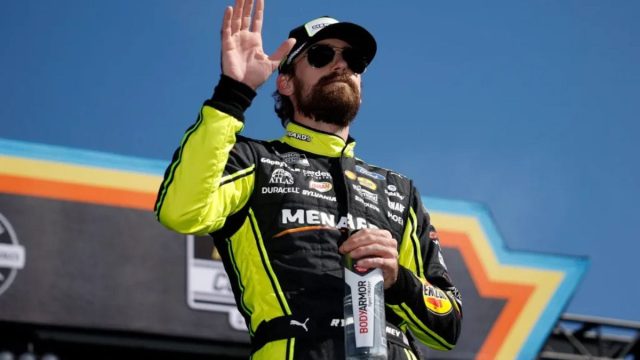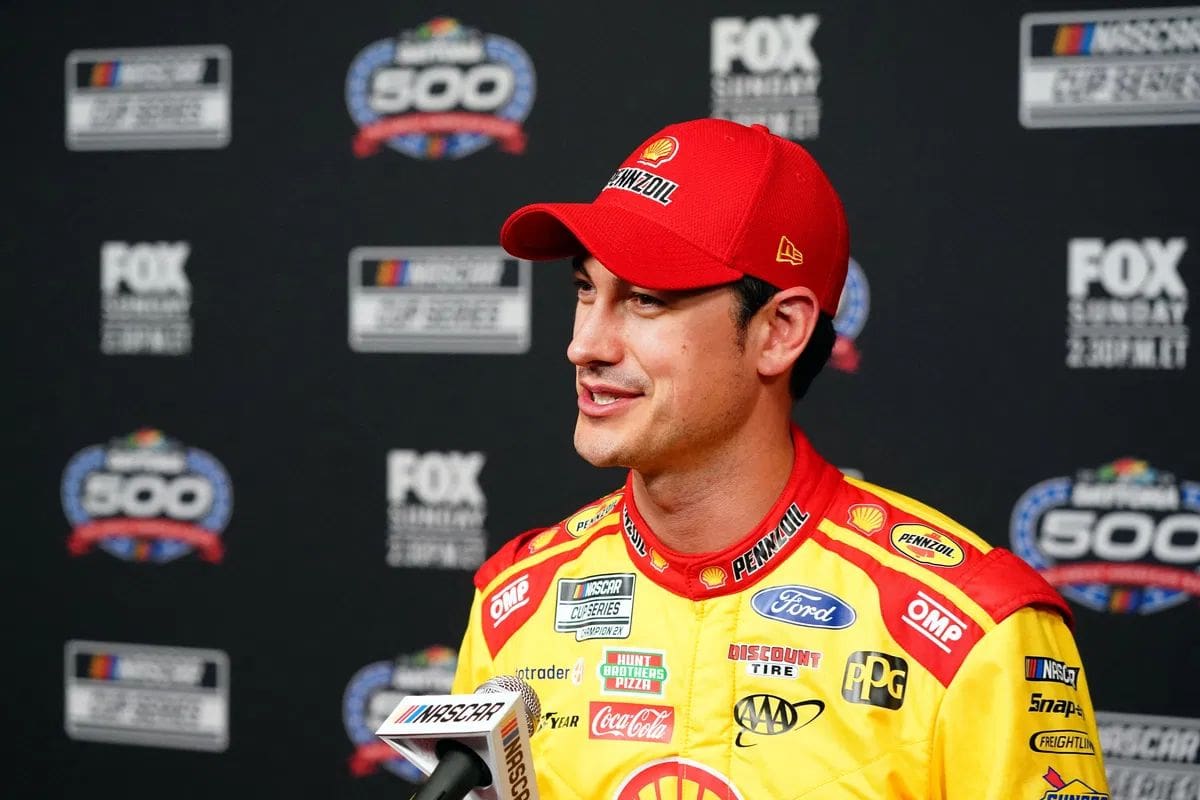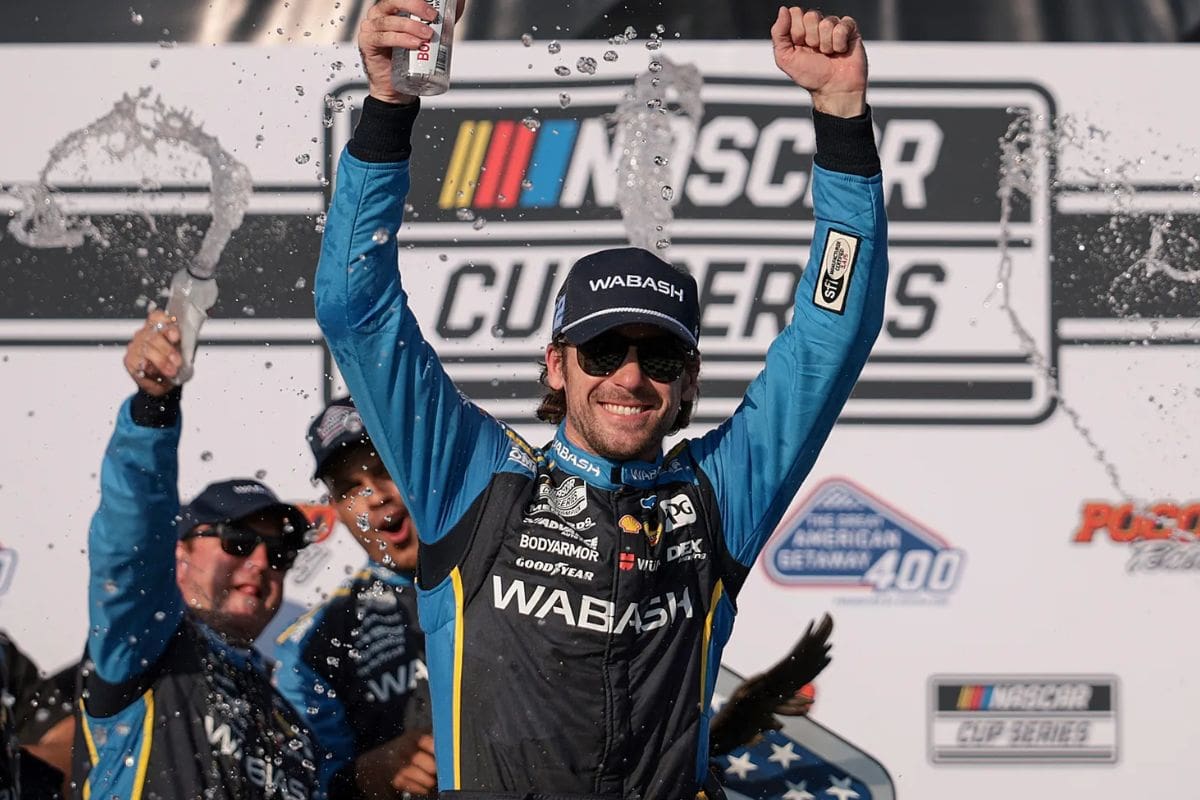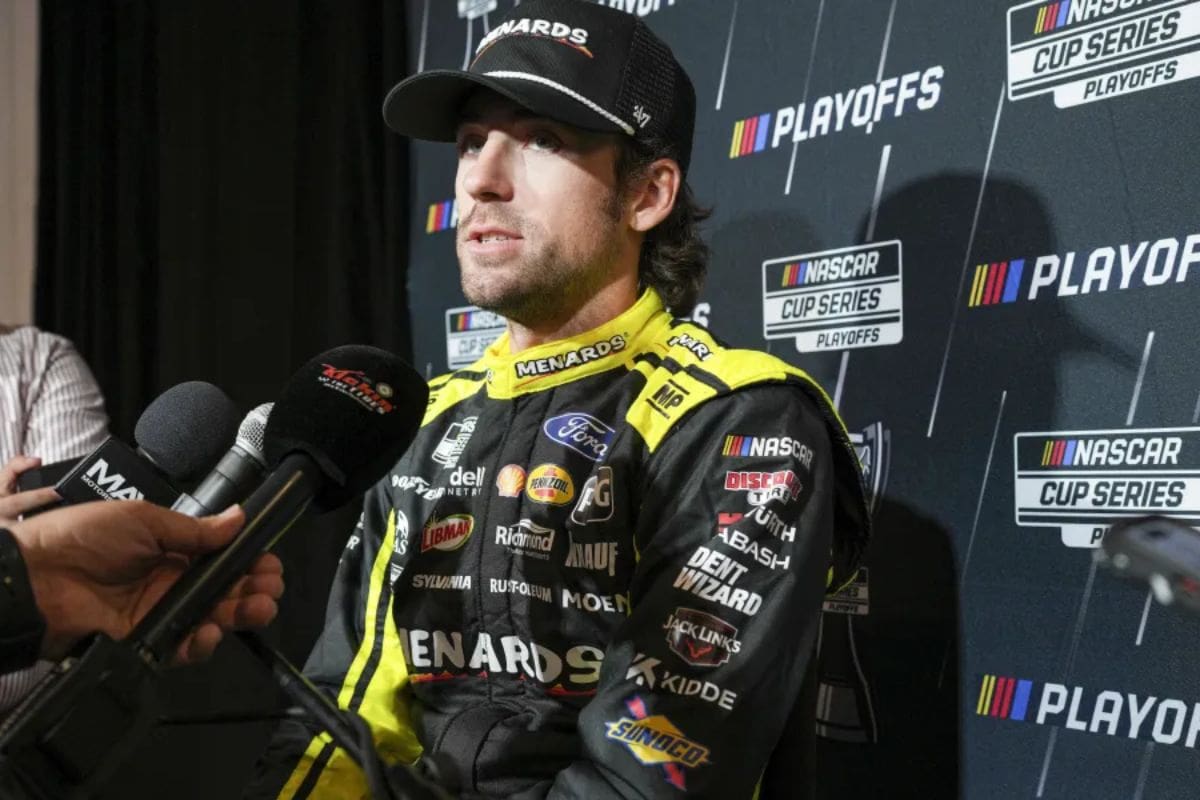Ryan Blaney’s Watkins Glen Misery: Ryan Blaney‘s recent brush with playoff elimination has sparked an intense debate surrounding NASCAR’s Damage Vehicle Policy (DVP), especially following his tumultuous experience at Watkins Glen. As he navigated the aftermath of a noteworthy wreck, his tactical skill shone through with a vital third-place finish at the Quaker State 400, propelling him back into playoff rivalry. However, Blaney’s call for a reassessment of DVP rules shows a broader tension within the sport—one that raises questions about equity and strategy in racing. What implications will this controversy have on the future of NASCAR’s competitive framework?
Key Highlights
- Blaney’s early crash raised concerns about his playoff viability, but strategic points earned from consistent finishes kept him in the mix.
- A third-place finish at the Quaker State 400 provided crucial points and maintained his lead over playoff competitors like Larson and Truex.
- Blaney’s position was bolstered by favorable track characteristics aligning with his Ford Mustang’s strengths, enhancing his chances for upcoming races.
- Advocacy for rule changes regarding damage assessment reflects Blaney’s frustration with competitive fairness after being eliminated by an incident beyond his control.
- His tactical approach and adaptability in racing are vital for securing his playoff spot, especially against close competitors like Briscoe and Gibbs.
Joey Logano’s Win Keeps Team Penske in Playoffs, But Blaney Struggles
While Joey Logano’s victorious achievement at Atlanta secured a crucial playoff spot for Team Penske, the contrasting fate of Ryan Blaney highlighted the unpredictable nature of motorsport. Logano’s victory not only fortified his position but also emphasized the team’s tactical skill as they navigate the complexities of the NASCAR season. By clinching a win at a critical race, Logano’s performance illuminated the vital importance of timing and execution, key elements that can determine playoff eligibility.
Conversely, Blaney’s misfortune at ‘The Glen’ serves as a glaring reminder of the volatility that permeates the sport. An early lap wreck not only derailed his race ambitions but also cast a shadow over his playoff prospects. This incident encapsulated the unpredictable dynamics that can swiftly alter a driver’s path. The of Blaney’s early exit extend beyond personal disappointment; they resonate within the broader competitive landscape of Team Penske and its aspirations for championship glory.
The contrast of Logano’s success and Blaney’s struggle raises pertinent questions about consistency and resilience in NASCAR environments. While Logano capitalized on his opportunity, Blaney faced the harsh reality of racing—one misstep can obliterate the carefully crafted plans of a seasoned driver.
In this intricate interplay of fortune and skill, the ongoing narrative of Team Penske emphasizes the necessity for adaptability in the face of adversity, a crucial lesson for all competitors in the NASCAR circuit.
NASCAR Pundit Offers Hope for Blaney’s Playoff Chances
The contrasting fortunes of Joey Logano and Ryan Blaney have sparked discussions among NASCAR analysts regarding Blaney’s potential for a playoff resurgence. Despite a rocky start to the playoffs, which included an early crash, Blaney’s prospects may not be as dire as they initially appeared.
According to NASCAR pundit Jordan Bianchi, Blaney’s performance at the Quaker State 400, where he secured a third-place finish, provided him with essential points that could play a significant role in his playoff strategy.
With the field narrowing as the playoffs progress, points accumulation becomes a critical aspect of survival. Blaney currently holds a lead over notable competitors like Kyle Larson, Martin Truex Jr., and Denny Hamlin, who are also vying for a coveted position in the next round.
“The good news for him, he’s still in a relatively safe area where even if he has a so-so race at Bristol he’s moving on. But man, you lose, I think he lost 17ish points or something like that.”-(BIANCHI)
Jeff and Jordan discuss Ryan Blaney's fate after his Lap 1 wreck: "The rule, to me, is pretty clear." 😅 pic.twitter.com/XY2JCWH1JM
— Dirty Mo Media (@DirtyMoMedia) September 16, 2024
Bianchi’s insights suggest that even though Blaney remains winless in the opening two races, his point advantage from the earlier stages offers him a glimmer of hope.
As the playoff series continues, Blaney’s ability to navigate the upcoming races tactically could solidify his standing. Analysts emphasize the importance of consistency and adaptability in these environments, suggesting that a calculated approach could yield further opportunities.
With the right combination of skill, strategy, and a bit of luck, Ryan Blaney might just find himself in a position to extend his playoff journey beyond the initial round, proving that a comeback is indeed within reach.
Blaney’s Points May Be Enough for Playoff Safety
Ryan Blaney’s position in the playoff standings suggests a pathway to safety, even amidst the turbulence of his recent performance. Currently sitting 8th with 29 points, Blaney has managed to carve out a buffer against elimination, particularly in the wake of his struggles during recent races. According to NASCAR analyst Jordan Bianchi, Blaney’s standings afford him a relatively secure spot; even a mediocre performance at Bristol may allow him to advance. This is a crucial insight, given the volatile nature of playoff racing.
Blaney’s closest competitors, Kyle Larson and William Byron, trail him with 26 and 25 points, respectively. This slight margin highlights the importance of consistency as the playoffs progress. While Blaney’s recent results have seen him lose approximately 17 points, his current standing allows for a tactical approach in the upcoming race.
Unlike Chase Briscoe and Ty Gibbs, who find themselves in precarious positions with only 6 points—requiring dramatic measures to advance—Blaney can afford to focus on maintaining his position rather than risking aggressive moves that could jeopardize his playoff hopes.
As the playoffs unfold, Blaney’s ability to navigate this crucial crossroads will be tested. The question remains: can he utilize his points advantage to secure a spot in the next round? With the right plan and a touch of luck, Blaney stands a good chance of solidifying his playoff safety despite recent setbacks. The upcoming races will certainly be essential in determining his path.
Blaney’s Future Looks Bright at Favorable Tracks
Blaney’s recent performance may have raised concerns, but the upcoming race venues present a favorable landscape for him and Team Penske. As the playoffs progress, the next two tracks are poised to align perfectly with the strengths of the Ford Mustang that Blaney pilots. Remarkably, the success illustrated at Atlanta serves as a harbinger of potential victories at similar speedway configurations, where Blaney’s driving skill can be improved.
The synergy within Team Penske cannot be overstated, particularly with Joey Logano, a seasoned competitor, who may offer valuable insights and support to strengthen Blaney’s performance. Logano’s early qualification serves as an advantage, allowing him to provide tactical guidance and share data that could improve Blaney’s approach to these upcoming races.
The collaboration between the two drivers is essential, especially in a high-pressure playoff environment where teamwork can greatly influence outcomes.
Moreover, the characteristics of the upcoming tracks favor the aerodynamics and handling of the Penske Fords. Blaney’s ability to navigate tight corners while maintaining speed will be critical. The team’s engineering skill, combined with their recent data from successful outings, places them in a unique position to take advantage of these opportunities.
Ryan Blaney Pushes for Rule Change After Wreck at Watkins Glen
In the wake of a tumultuous incident at Watkins Glen, where an initial-lap wreck severely impacted his race, Ryan Blaney has emerged as a vocal advocate for changes to the current rules governing damage assessments. The crash, triggered by Corey LaJoie’s misjudgment entering turn one, created a cascade of destruction, eliminating several contenders, including Blaney himself.
While others, like Denny Hamlin, managed to escape the chaos, Blaney’s damaged vehicle ultimately ruled him out for the remainder of the race, leaving him with zero points.
Blaney’s frustration is palpable, as he contends that the existing guidelines do not adequately account for the intricacies of race incidents. As highlighted by Jordan Bianchi, the interpretation of the rules seems rigid, stating, “The rule to me is pretty clear.”
“It’s just a tough day, it’s frustrating. I get his frustration about the whole towing back thing, if we should be able to look at that kind of thing. But the rule to me is pretty clear. This has not been officiated any different that how it had been. You did have damage from the crash. So it’s a tough break and it’s unfortunate. The only good thing is you had a bunch of points in your back pocket.”-(bianchi)
This can lead to unjust outcomes for drivers who find themselves collateral damage in accidents not of their making. Blaney’s call for a rule change is not merely an emotional response; it reflects a deeper concern about fairness and competitive integrity within the sport.
News in Brief: Ryan Blaney’s Watkins Glen Misery
Ryan Blaney’s experience during the DVP controversy shows the intricate dynamics of NASCAR’s competitive environment. The tactical maneuvers at the Quaker State 400, coupled with a strong advocacy for rule adjustments, reveal the complexities faced by drivers in securing playoff positions. Blaney’s adaptability, combined with Team Penske’s collaborative efforts, demonstrates a pathway for success amidst challenges. As discussions on fairness and consistency in damage assessments continue, the future of competitive equity in NASCAR remains a critical focus for all stakeholders.
ALSO READ: NASCAR’s Harsh Rulebook Ruins Ryan Blaney’s Race: Fans Demand Change



